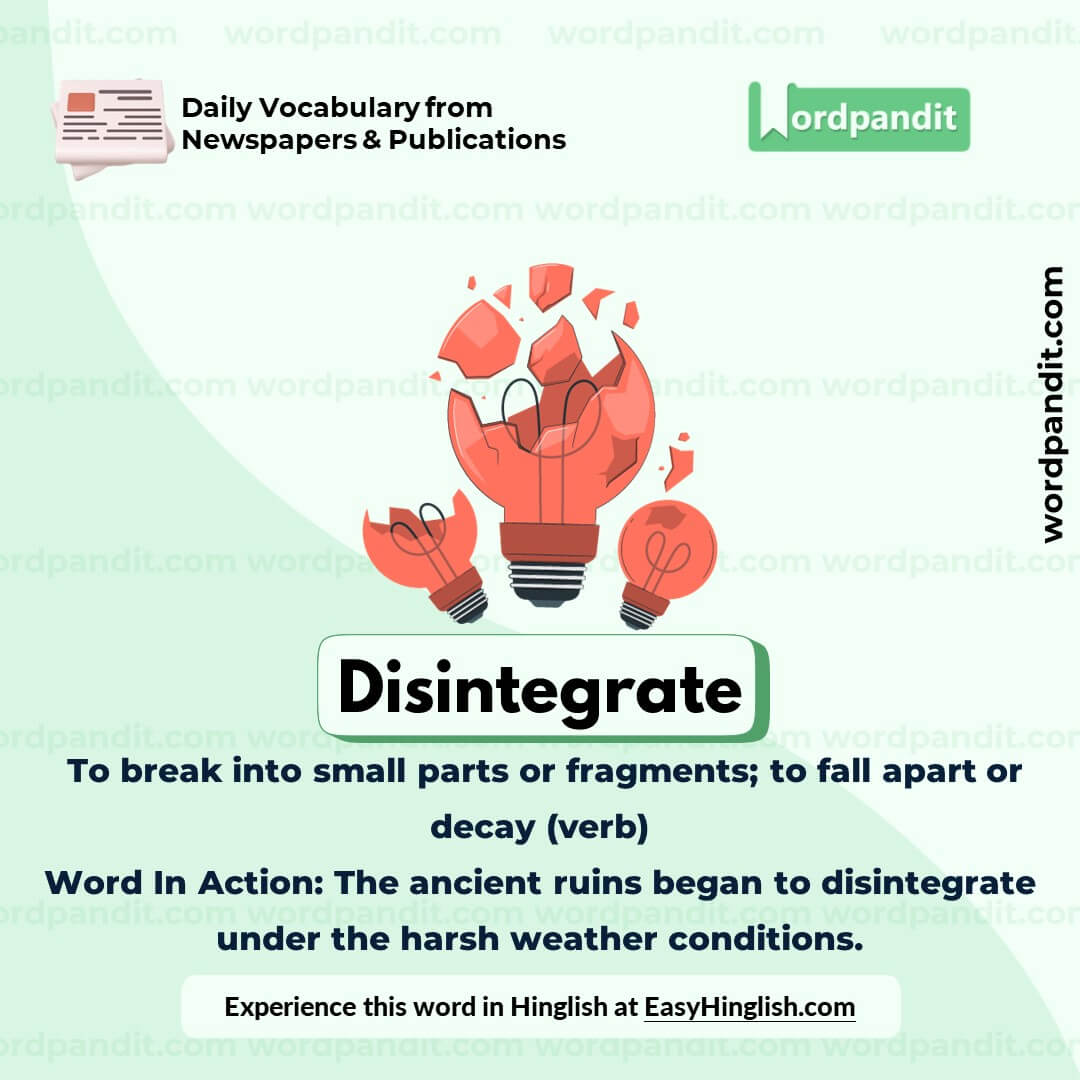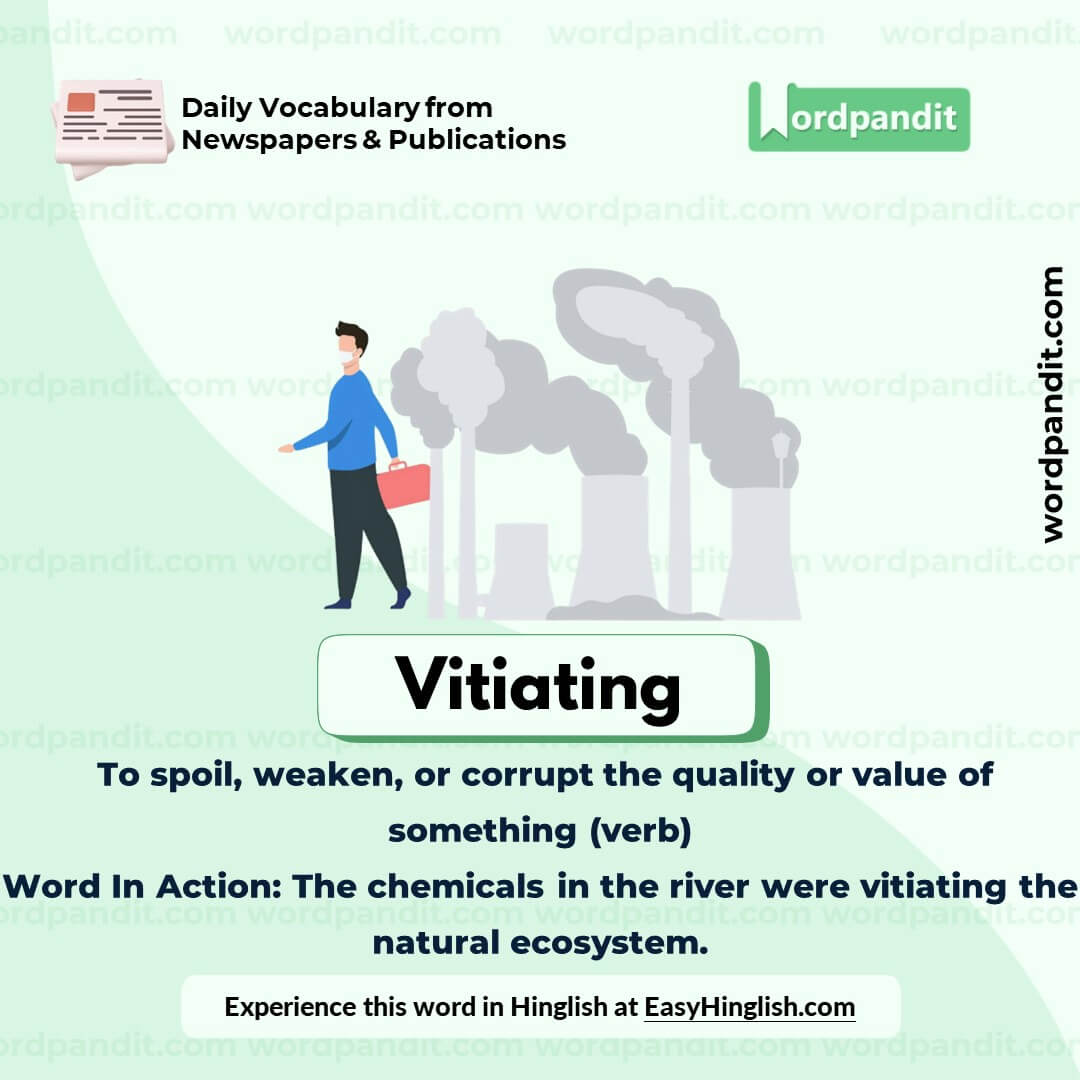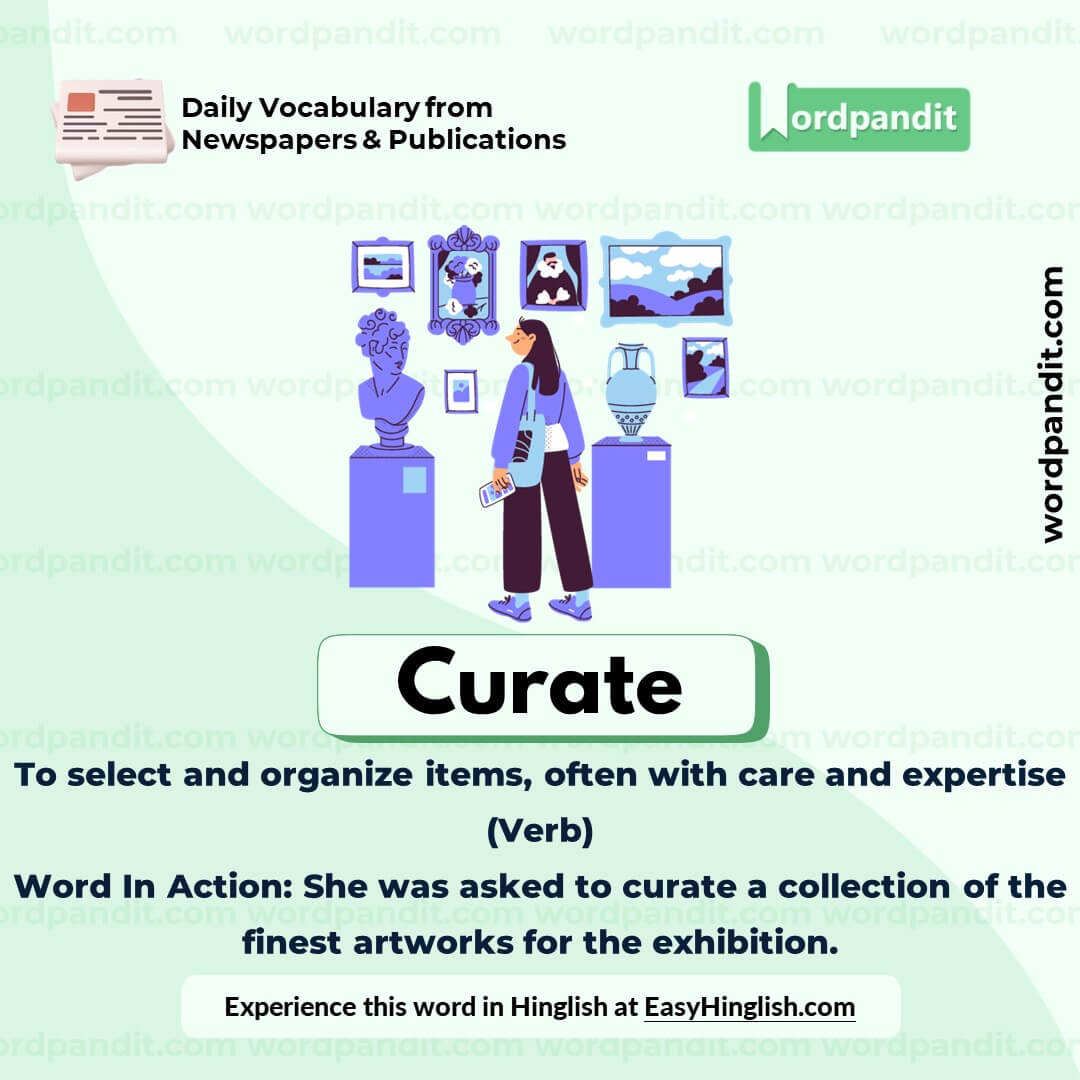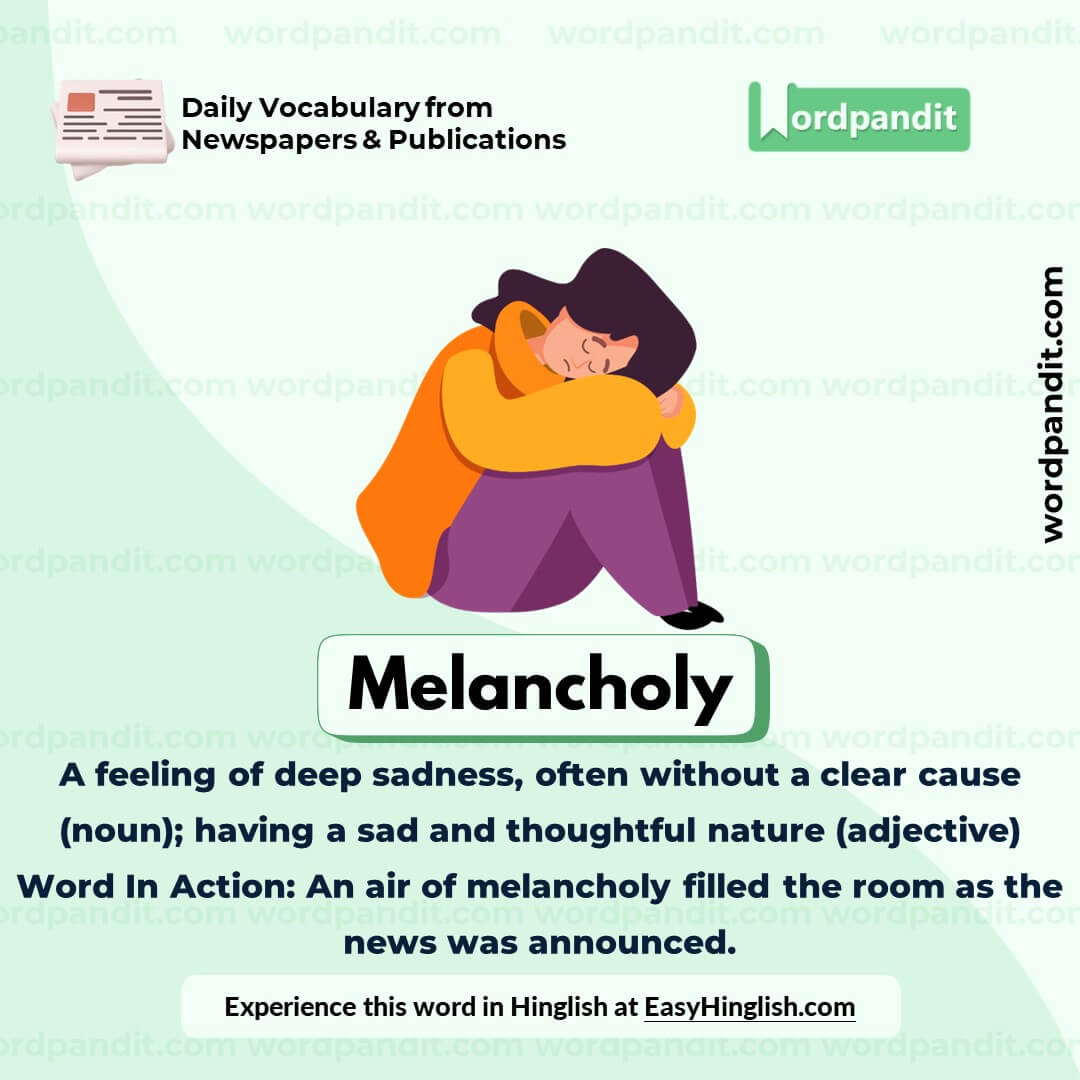Daily Vocabulary from Indian Newspapers and Publications
Welcome to Wordpandit’s Indian Vocabulary Hub
At Wordpandit, we understand the importance of staying rooted in the local context while expanding your language skills. This section focuses on enriching your vocabulary with words and phrases drawn from India’s leading newspapers and publications, ensuring you're learning vocabulary that is practical, relevant, and uniquely Indian.
Why Indian Sources Matter
We believe that the best way to master any language is by immersing yourself in local content. That’s why we carefully curate vocabulary from top Indian publications, including:
- The Hindu
- The Times of India
- The Economic Times
- Hindustan Times
- Live Mint
- The Indian Express
- And many others...
Stay Updated, Stay Relevant
With daily updates from Indian news sources, you’ll be consistently learning words that reflect the trends and shifts in Indian society and culture. Our focus is to provide vocabulary that enhances your understanding of the language in an Indian context.
How Wordpandit Supports Your Goals
Whether you’re preparing for exams, aiming to improve your professional communication, or simply want to stay connected with the latest Indian vocabulary, Wordpandit is here to guide you every step of the way.
Learn with a Practical Approach
Our interactive learning methodology includes real-world examples, engaging activities, and context-specific usage to ensure that every word becomes part of your active vocabulary.
Dive into Indian Vocabulary Today!
Why Choose Wordpandit?
Practical Learning: Focus on words you'll actually encounter in real-world reading, enhancing your comprehension and communication skills.
Diverse Content: From current affairs to scientific breakthroughs, our varied sources expose you to vocabulary across multiple domains.
Effortless Integration: Make Wordpandit a part of your daily routine. Just a few minutes each day can significantly boost your lexicon over time.
Your Path to Vocabulary Mastery
- Visit our Daily Vocabulary section regularly
- Explore new words and their usage in context
- Practice incorporating these words into your own writing and speech
- Track your progress as your vocabulary expands
Start Your Journey Today
Embark on your vocabulary enhancement journey with Wordpandit. By consistently engaging with our daily posts, you'll build a robust vocabulary that serves you well in academic, professional, and personal contexts.
Remember, a word a day keeps linguistic limitations at bay. Make Wordpandit your daily companion in the quest for vocabulary excellence!
WORD-1: Disintegrate
Context:
"An asteroid hit Earth's atmosphere over Russia's Yakutia, creating a bright flash. It disintegrated on impact, with no damage or injuries reported." - Hindustan Times
Explanatory Paragraph:
"Disintegrate" refers to the process of breaking apart into smaller pieces or fragments, often due to a force or natural process. It can describe physical objects, such as an asteroid breaking up on impact, or metaphorically refer to systems or relationships falling apart.
Meaning: To break into small parts or fragments; to fall apart or decay (verb).
Pronunciation: dih-SIN-tuh-grate
Difficulty Level: ⭐⭐⭐ Intermediate
Etymology: Derived from Latin "dis-" meaning "apart" and "integratus" meaning "made whole," indicating the process of breaking apart from a whole.
Synonyms & Antonyms:
Synonyms: Break up, fragment, crumble, shatter
Antonyms: Combine, unite, integrate, assemble
Usage Examples:
- The ancient ruins began to disintegrate under the harsh weather conditions.
- As the spacecraft re-entered the atmosphere, it started to disintegrate due to intense heat.
- The organization disintegrated after years of internal conflict.
- The fragile vase disintegrated into shards when it fell to the ground.
Cultural Reference:
"In the movie 'Avengers: Infinity War,' Thanos's snap caused half the universe's population to disintegrate into dust, symbolizing loss and destruction on a massive scale." - Marvel Cinematic Universe
Think About It:
Can you think of an example where something disintegrated but ultimately led to something new being created?
Quick Activity:
Identify and write down three examples from history, literature, or science where disintegration played a crucial role in a story or event.
Memory Tip:
Imagine a sandcastle being hit by waves and disintegrating into grains of sand — breaking apart completely. This visualization can help you remember the meaning of the word.
Real-World Application:
The term "disintegrate" is commonly used in science to describe objects breaking apart, such as meteors entering the atmosphere, or in daily life to describe relationships, systems, or objects that fall apart over time.
WORD-2: Acquisition
Context:
"The big company's newest acquisition is a small chain of clothing stores." - Hindustan Times
Explanatory Paragraph:
The term "acquisition" refers to the process of gaining ownership or control of a company, asset, or item. It is often used in the business world to describe when one company purchases another or acquires assets to expand operations, enhance its portfolio, or gain a competitive edge.
Meaning: The act of acquiring something, especially as a business transaction (noun).
Pronunciation: ack-wuh-ZIH-shun
Difficulty Level: ⭐⭐ Intermediate
Etymology: Derived from the Latin word "acquirere," which means "to get or obtain."
Synonyms & Antonyms:
Synonyms: purchase, attainment, procurement
Antonyms: loss, surrender, relinquishment
Usage Examples:
- The company's acquisition of new technology has streamlined its production process.
- Her acquisition of language skills helped her secure a job abroad.
- The museum's latest acquisition is an ancient sculpture from Greece.
- Acquisition of knowledge is an ongoing process throughout life.
Cultural Reference:
"Acquisition fever" was a common term in the 1980s to describe the aggressive purchasing of companies by large conglomerates during a period of economic expansion. - Business History Archives
Think About It:
How can acquisitions benefit small businesses, and what challenges might they face during the process?
Quick Activity:
Identify a recent acquisition in the news and write a short paragraph on its potential impact on the industry.
Memory Tip:
Remember "acquisition" by associating it with "acquiring" or "getting hold of something new."
Real-World Application:
The word "acquisition" is widely used in the business context, especially when companies announce mergers or purchases of other firms. It is also relevant in education and personal growth, referring to gaining knowledge or skills.
WORD-3: Vitiating
Context:
"Unlawful recovery of excess payment from faculties and vitiating the harmony between the IIT campus and neighbouring community." - Hindustan Times
Explanatory Paragraph:
"Vitiating" refers to the act of spoiling or impairing the quality, effectiveness, or integrity of something. It is often used in legal, ethical, or social contexts to describe actions that undermine or corrupt otherwise positive or neutral circumstances.
Meaning: To spoil, weaken, or corrupt the quality or value of something (verb).
Pronunciation: VISH-ee-ay-ting
Difficulty Level: ⭐⭐⭐ Advanced
Etymology: Derived from Latin "vitiatus," the past participle of "vitiare," meaning "to injure, spoil, or corrupt," and ultimately from "vitium," meaning "fault or defect."
Synonyms & Antonyms:
Synonyms: Corrupting, spoiling, weakening, impairing
Antonyms: Strengthening, enhancing, fortifying, improving
Usage Examples:
- The unfair practices of the board were accused of vitiating the integrity of the election process.
- Pollution is vitiating the air quality in urban areas, posing a risk to public health.
- The constant bickering among team members ended up vitiating the work environment.
- The contract was declared void due to factors vitiating its legality.
Cultural Reference:
"In Shakespeare's 'Othello,' Iago's deceitful actions are central to vitiating the trust between Othello and Desdemona, ultimately leading to tragedy." - William Shakespeare
Think About It:
Can you think of a situation where actions that vitiated trust led to a long-lasting impact on relationships or society?
Quick Activity:
Write a short paragraph describing an event where harmful actions vitiated a positive outcome. Reflect on how the situation could have been resolved differently.
Memory Tip:
Remember "vitiating" by associating it with "vice" — actions or qualities that spoil or corrupt something good.
Real-World Application:
The term "vitiating" is often used in law to describe factors that invalidate agreements, and in social discussions to highlight actions that harm community relationships or ethical standards.
WORD-4: Curate
Context:
"Three meticulously curated volumes, the late A.G. Noorani documented the entire history of the dispute over the Babri Masjid and its eventual destruction in 1992." - The Wire
Explanatory Paragraph:
The word "curate" refers to the careful selection, organization, and presentation of items, ideas, or content, typically with the intention of creating a meaningful or high-quality collection. It is often associated with the roles of museum curators but is now widely used in contexts like content creation, event planning, and more.
Meaning: To select and organize items, often with care and expertise (Verb)
Pronunciation: KYUR-ayt
Difficulty Level: ⭐⭐⭐ Intermediate
Etymology: From Latin "curare," meaning "to take care of."
Synonyms & Antonyms:
Synonyms: Organize, assemble, compile, arrange, select
Antonyms: Disorganize, scatter, neglect, ignore
Usage Examples:
- The gallery curator meticulously curated the exhibition to highlight the artist's evolution over the years.
- She curated a playlist that perfectly matched the theme of the dinner party.
- He curated a collection of essays that offered diverse perspectives on climate change.
- The museum team spent months curating artifacts for the historical exhibit.
Cultural Reference:
"Curated experiences, such as Airbnb’s ‘Experiences’ feature, allow travelers to connect with local cultures in meaningful ways." - Travel Digest
Think About It:
How has the digital age expanded the concept of curation, and what are the challenges of curating content online?
Quick Activity:
Curate a list of five books, movies, or songs that you would recommend to a friend and explain your choices.
Memory Tip:
Remember "curate" by thinking of a museum curator carefully taking care of art collections.
Real-World Application:
Professionals curate content in various fields, such as museums, media, marketing, and social platforms, to ensure relevance, engagement, and high standards of quality.
WORD-5: Melancholy
Context:
"But even in this land of constant change, there’s a sense of melancholy in the air as Intel, the once-unquestioned king of chips, stumbles towards an uncertain future." - Hindustan Times
Explanatory Paragraph:
"Melancholy" refers to a deep, often pensive sadness or a thoughtful sense of sorrow. It is typically used to describe a feeling that is reflective and somber rather than intense or overwhelming. The term is often associated with situations of nostalgia, loss, or introspection.
Meaning: A feeling of deep sadness, often without a clear cause (noun); having a sad and thoughtful nature (adjective).
Pronunciation: MEL-uhn-koh-lee
Difficulty Level: ⭐⭐ Beginner
Etymology: Derived from Greek "melankholia," meaning "black bile," which ancient Greeks believed caused sadness.
Synonyms & Antonyms:
Synonyms: Sadness, sorrow, gloom, pensiveness
Antonyms: Joy, cheerfulness, happiness, elation
Usage Examples:
- A sense of melancholy filled the room as the team bid farewell to their retiring coach.
- The novel's ending leaves the reader with a lingering melancholy that is hard to shake off.
- He gazed at the old photographs with a melancholy expression, remembering the good times of the past.
- The melancholy music resonated with her mood on that rainy afternoon.
Cultural Reference:
"Melancholy is a recurring theme in poetry, often explored in works like John Keats' 'Ode on Melancholy,' which reflects on the coexistence of beauty and sadness in life." - John Keats
Think About It:
Do you think melancholy can ever be a positive emotion, allowing people to reflect and grow?
Quick Activity:
Write a poem or a short paragraph that captures a moment of melancholy in your life. Focus on describing your emotions and thoughts vividly.
Memory Tip:
Associate "melancholy" with the image of a calm, cloudy day that feels both peaceful and a little sad — capturing the reflective and somber nature of the word.
Real-World Application:
"Melancholy" is widely used in literature, art, and music to evoke a reflective or somber mood, often helping to communicate deeper emotions in storytelling or creative works.
















